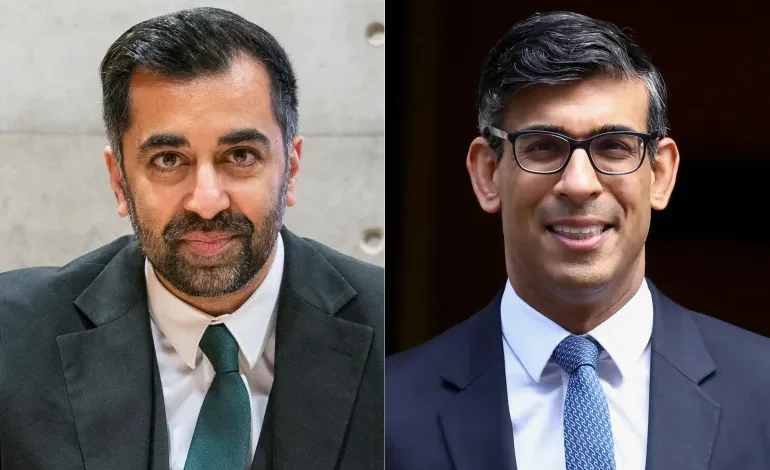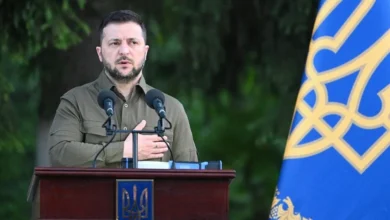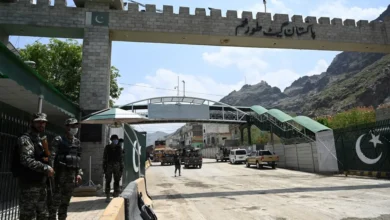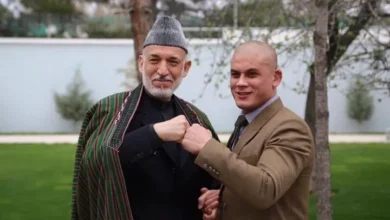‘The empire strikes back’: Brits laud diversity in UK politics

When Humza Yousaf became Scotland’s new leader this week, the world of British politics entered a new era of diversity.
With Pakistani-origin Yousaf in charge at Holyrood and Rishi Sunak, whose ancestors hail from India, leading at Westminster, it could be said that the United Kingdom is blazing a new trail in post-colonial history.“The empire strikes back,” tweeted Jelina Berlow-Rahman, a human rights lawyer in Glasgow, after Yousaf’s victory.
Rahman, the daughter of Bangladeshi immigrants, sees the moment as one of triumph which fuelled pride in her own parents, who worked hard to give their children a better start in life.
“It’s harder for people from an ethnically diverse country to prove themselves and integrate, especially when they’re from a visible minority,” she told Al Jazeera.
Raised in London, human rights lawyer Berlow-Rahman moved to Scotland to study.
But unlike Yousaf, who backs Scottish independence, she doesn’t want the UK to break up, so would be unlikely to support his Scottish National Party.
She also isn’t a fan of Sunak’s right-wing Conservative government, which is pushing through controversial legislation aimed at cracking down on asylum seekers arriving across the English Channel.
She wonders if Sunak and Home Secretary Suella Braverman, whose Indian-origin parents came from Kenya and Mauritius, feel that, as minorities, they have to prove themselves to their party.
“It’s their way of doing it,” she said. “Sometimes the language and manner could be toned down.”
From across the political divide, Foysol Choudhury, the Bangladesh-born Labour member of the Scottish Parliament, said that Yousaf’s rise to power is a proud moment for the South Asian community.“I know how difficult it is to be a minority and to go into politics,” he said. “It’s something to be celebrated. I’m really proud of him.”
To make a difference, Yousaf should stand up for his own ideas, he said.
But even though those ideas will inevitably differ from his own, he will always be up for a chai with his old friend.
Often, they are joined by Anas Sarwar, the Scottish Labour leader born to Pakistani Muslims.
“A lot of the time, after the debates, we’ll walk out together and talk about other things,” he said.
“It shows we’re all human.”
For Qasim Hanif, Glasgow-based convener of Scots Asians for Independence, the prospect of a Scots-Pakistani and a British Indian negotiating the partition of the UK is too compelling to ignore.
“In 1947, the British Empire would not have foreseen this,” he said. “Some of those colonialists would be turning in their graves.”
Yousaf says he wants to convince a “sustained majority” before firing the starting gun on “indyref2” – the second referendum being proposed by the Scottish government on secession.
The last vote, in 2014, saw most Scots vote to remain.The 2016 European Union membership referendum, however, swayed opinion.
While the majority in England voted to quit the bloc, most Scots had wanted to remain in the EU – a schism which saw the Scottish independence movement regain momentum.
Hanif believes Yousaf was right to ditch his predecessor Nicola Sturgeon’s plans to turn the next UK general election into a de facto referendum.
“He knows how to play politics. If he calls a de facto referendum, he will already be on the back foot,” he said. “The UK establishment will tie you up in legal battles for years and years.”
But he hopes Yousaf will go straight into battle, lodging his legal challenge to the UK government’s Section 35 veto on Scotland’s controversial gender reforms, which will make it easier for people to change their recognised gender.
“They need to respect the will of the Scottish Parliament,” he said.
As an opening gambit, it’s a high-risk move.
Some, not least within Yousaf’s own party, question the wisdom of doubling down on a dossier that bedevilled Sturgeon’s last weeks in office.
Yousaf has been derided as a continuity leader of a party that has grown complacent after 16 years in power.
But his trenchant defence of the party’s progressive values has reaffirmed the SNP’s manifesto, bringing the growing chasm between Scotland and England into sharper focus.
As a French citizen who arrived in Scotland post-Brexit, Assa Samaké-Roman is acutely aware of the diverging paths of the two nations on immigration.
“What the Tories are doing in government is dog whistles to the far right,” said the journalist. “In Scotland, they’re not having that.
“This is the point of Scottish independence. The SNP is campaigning to escape the cruel social and immigration policies that Scotland didn’t even vote for,” she said.
In her view, Sunak’s Tories at Westminster represent a “toxic brand of Britishness”.
By contrast, Scotland espouses civic nationalism.











